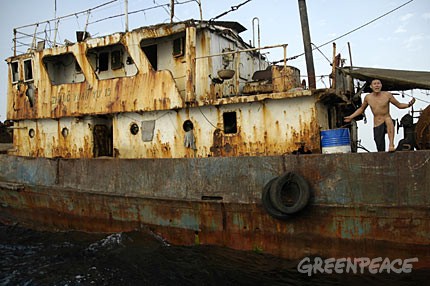These unlicensed, rotting, illegal fishing vessels are crewed with slave labor
A lot of complicated diplomatic negotiations go into the laws that dictate which countries can take which fish from which international waters. But the business of high seas fishing is as lucrative as it is difficult to police. And who can say which fish really came from which waters? Many officials are inclined (with bribes) to look the other way. Others may not even realize there is a problem with a load of fish that are actually from mixed sources.
These are the market forces that drive the "Chinese zombie ships." These ships are former fishing vessels which were abandoned by their original owners, sold, or simply stolen. They chug slowly through the planet's oceans, fishing illegally, and selling their catch to unscrupulous "real" fishing vessels.
These pirate ships ply international waters, or anchor just off the coast of countries like Guinea with no effective navy or Coast Guard equivalent to police ships anchored in her waters. The ships are rotting away - maintenance costs money - and all safety measures have long since been abandoned. Leaking fuel and oil, fishing illegally, these ships rarely dock in port. Docking in port raises too many questions, and exposes the ships to the authorities.
Smaller ships, many of them inflatable Zodiac-style rafts, zip back and forth to the ships. They ferry food, water, and gasoline; everything the zombie fleet needs to survive.
Oh, and slave labor.
Most of the crew of these ships are being held against their will, in a form of indentured servitude with little hope for escape. They work the ships because the captains threaten their families, or because they are simply not allowed to leave, and are beaten (or worse) if they refuse to work.
Human life is as cheap as a clapped-out fishing freighter these days. Their illegal catch is sold to various vessels, depending on the catch. According to Greenpeace, "High value stock goes to Las Palmas, in the Canaries, and off to the dinner tables of Europe. The "dirt" fish is shipped to Africa."
High seas piracy may sound alluring and intriguing, but the reality is far from the swashbuckling imagery of Hollywood. This lawless fleet of rusted out fishing ships crewed by people with no hope for freedom is a depressing reminder of the economic realities that exist in so much of the world today. It's a real problem, but it's unclear who is going to fix it, much less how.
